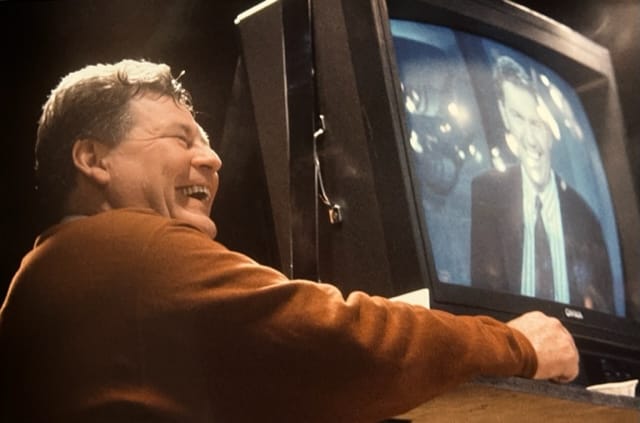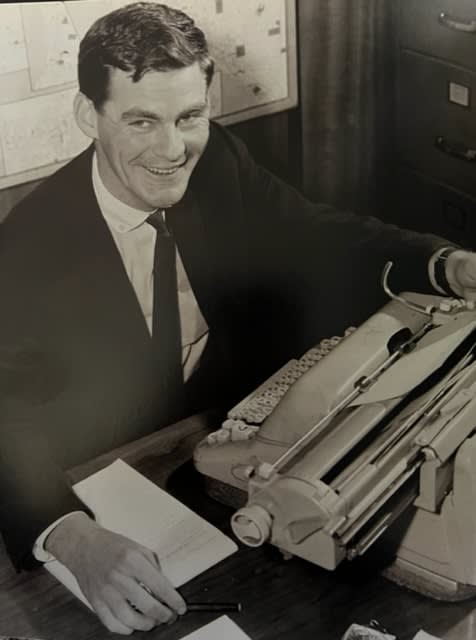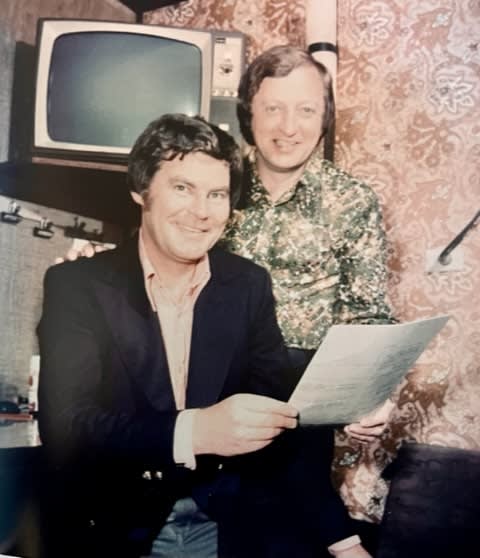
The world awoke a far less funny place last week – although, in fairness, we’ve still got his memorial service to go.
Mike McColl Jones, Australia’s most admired, enduring and prodigious writer of comedy for live variety television, has died after a short battle with illness – or, as Mike would have described it, a long battle with dubious canteen food and cantankerous television management.
He would have been 104 this August if he’d lived another 17 years.
Mike McColl Jones began writing comedy for Graham Kennedy’s In Melbourne Tonight in the early 1960s, and for the next 40 years worked continuously at the epicentre of the Australian entertainment industry through the golden age of television, writing for landmark live variety shows that shaped Australian popular culture, including In Melbourne Tonight, The Don Lane Show, The Graham Kennedy Show, Tonight With Bert Newton, The Bert Newton Show, Tonight Live with Steve Vizard – and countless live special-event broadcasts, including 25 Logies and two Royal Command Performances for Queen Elizabeth, and Prince Charles and Princess Di.
Over four decades, Mike wrote jokes and nurtured the performances of generations of television hosts, including Don Lane, Tommy Hanlon Jnr, Bobby Limb, myself, Noel Ferrier, Frank Thring, Daryl Somers, Mary Hardy, and scores of others.
But of all the stars for whom Mike wrote, the relationship he most treasured was his extraordinary partnership with the undisputed kings of Australian television, Graham Kennedy and Bert Newton. Said Bert of Mike: “When it came to writing one-liners and personality material, Mike was simply without peer.”
A ‘rough and ready education’
Mike McColl Jones was born on 12 August, 1937, in Kew, the leafy eastern suburb of Melbourne from which he would never move. He attended Xavier College in Kew, a school famous for providing “a rough and ready education” for Australia’s greatest fictional dignitary, Sir Les Patterson KBE, as well as Mike’s contemporary and lifelong friend, Philip Brady.
Television transformed Australia in 1956. As a teenage viewer, Mike was instantly captivated by the live chaos of GTV9’s new hit tonight show, In Melbourne Tonight, hosted by a brilliant young star only three years older than Mike, Graham Kennedy.
Each night, Mike sat spellbound in front of his parents’ television set, studying the rhythm and cadence of Kennedy’s uncanny comedic delivery.
And then Mike did something unusual and extraordinary – he carefully hand-wrote a dozen or so jokes he imagined might work for Graham.
In early 1962, Mike got his big break when his great schoolmate Philip Brady, now successfully working as a fledgling studio announcer at GTV9, showed a couple of pages of Mike’s handwritten gags to the producers of IMT. Before long, Mike was selling the odd joke as a freelancer to In Melbourne Tonight for three guineas for each joke performed.
In August 1963, 25-year-old Mike was summoned to the studios of GTV 9 to meet the station manager, Colin Bednall, who instantly offered the gawky McColl Jones full-time employment to write topical jokes for Graham Kennedy, shook his hand, handed Mike a typewriter, and ordered him straight down to the IMT production offices to start typing gags for that night’s show.

The epicentre of live TV comedy
In the 1960s, if you wanted to learn about comedy and live television, there was no better place than Studio 9, GTV9, Bendigo Street, Richmond, the home of IMT.
Television was the dazzling new medium just finding its feet, and everyone involved came from somewhere else.
Greatest of all was Mike’s mentor, Freddie Parsons, a generation older, who had written for Australia’s most brilliant pre-war comedian, Roy Rene, during the golden era of Tivoli and live vaudeville. And there was Graham Kennedy himself, a burgeoning master of comedic timing and innovation.
All of them took young Mike under their wings and offered him a daily impromptu masterclass in live entertainment.
Over the next seven years, Mike honed his craft writing thousands of gags and pieces for Graham and the IMT team, five days a week, until IMT ended in December 1969.
Following IMT, Mike wrote for The Graham Kennedy Show, and from 1975, for nine years on what would become most-awarded light entertainment show in Australian television history, The Don Lane Show, and then dozens more variety shows, including The Peter Couchman Show, and for more than a thousand episodes of Tonight Live with Steve Vizard.
Writing material for the top-rating tonight and variety shows of the day, Mike was constantly rubbing shoulders with and writing material for the world’s greatest stars: Muhammad Ali, Sammy Davis Jnr, Robin Williams, Billy Joel, Billy Crystal, Debbie Reynolds, Noel Coward, Bob Hope, David Bowie, Tony Curtis, Clint Eastwood, Kirk Douglas, Stevie Wonder… and on and on.
Mike recalled how the great visiting celebrities would sign the dressing room wall when they visited the studios of GTV9 – and how one summer holiday, management decided to spruce up the dressing rooms, and he returned from holidays to find all the prized star autographs painted over.

Listening at the heart of success
To look at Mike McColl Jones there was almost no visible indication he was in any way funny – putting aside his table manners.
Tall, handsome, athletically built and always urbanely dressed, Mike was notoriously shy and shunned the limelight. He preferred instead to stay in the background and observe, to quietly look and listen – really listen – a skill that was at the heart of his perennial success.
His other great abilty as a comedy writer was to view the world in jarringly unexpected ways. Freddie Parsons remarked that only Mike’s mind could have created gags such as “Thirty thousand troops arrived in New York today to entertain Bob Hope”, or “The Leaning Tower of Pisa was straightened today…Unfortunately Italy is now on a tilt.”
Mike fervently believed the role of comedy was to challenge the status quo, power, and sacred cows. Graham Kennedy said Mike’s great talent was to “say publicly what the viewer thought but would never dare put into words”.
Mike’s expertise at writing provocative material, coupled with Graham’s persona as enfant terrible, was at the heart of their enduring partnership that found Graham “apologising almost nightly, to caterers, airline magnates, politicians and press barons”.
Mike loved the serendipity of live television; it was the pulse of a network, the pulse of a nation. On live television, anything – everything – could go wrong, management could never interfere, and both studio and television audiences around the nation might at any moment be instantaneously bound together by the rapturous, transformational magic of shared chaos and unexpected laughter.
Live television was Mike’s lifelong drug of addiction.
A relentless daily ritual
Mike McColl Jones was a quiet powerhouse.
Each day he threw himself afresh into the relentless daily ritual of live variety television.
The shows for which he wrote were mainly broadcast at night, every night, yet each morning Mike religiously appeared at the studios at 9am, raring to go after a gruelling 1am finish the night before, to begin again scouring the daily newspapers in search of a headline, a news story, a tidbit of gossip from which he could quickly fashion today’s topical one-line gags.
The next few hours alone in his office, only a few rooms away from the stars for whom he wrote, Mike hunched over his typewriter knocking out three pages of closely-typed topicals.
Each night, showtime, Mike positioned himself next to camera three, only a couple of metres in front of the host set, intently watching the entire show unfold live, alert to any opportunities for fresh humour, for new chaos.
For nearly four decades, standing next to camera three, Mike watched his gags performed for the first and only time, as they recorded a moon landing, Nixon and Watergate, royal tours and presidential visits, a succession of Australian prime ministers from Robert Menzies to John Howard, the disappearance of one, wars and invasions, from black and white to colour, and a million other events that changed our lives.
From camera three, Mike watched as Kennedy uttered his infamous crow call “Farrrrrk”, which saw him banned from television; and when Don Lane threw a glass of water over his guest James Randi, the psychic exposer; and when Bert Newton, dressed as Demis Roussos, was confronted by the real Demis Roussos; and the night Rex Mossop and Julian Clary nearly came to blows; and when dozens of politicians and powerbrokers were maligned, called to account, or brought down to earth.

Humour with an international reach
Once in a blue moon, Mike agreed to write for an overseas star.
Joan Rivers once asked Mike for some jokes about her age. At the time, Halley’s Comet was about to make one of its infrequent appearances, and Mike sent Joan a gag – “I’m so old I’ve seen Halley’s Comet come around three times!”
Mike was surprised the next day when he turned on his television to see then US president Ronald Reagan at a Washington press conference repeating his Halley’s Comet gag. Turns out that the night before, Joan Rivers had been having dinner in Washington with her good friend Nancy Reagan, the president’s wife, who immediately went home and passed the gag on to her husband.
Mike was proud, too, that a gag he wrote for Bert Newton to open one Logies – “Welcome to the Logies, affectionately known by some of us here as Star Wars” – was used a couple of weeks later by Bob Hope to open the Academy Awards.
Mike was often asked by visiting stars whether he would consider working overseas. Mike always replied that things were fine just as they were.
The truth was Mike had everything he needed in Australia. He had two loves – his television and his family.
In 2017, Mike was awarded an OBE for his services to television – writing, in particular – which he observed at the time was right up there with winning the Friday-night meat tray at The Harp.
A belief that ‘funny is funny’
Mike McColl Jones was a gentle, imaginative man who was a direct, vital, unbroken, creative link to the age of vaudeville and the Tivoli greats who had tutored him in his early years, through the glorious era of radio, through the golden age of television when television was the only game in town and half the nation watched last night’s show, through cable television and the dawn of the new millennium, to the age of streaming and digital media.
Mike saw it all, and though the technological means of delivery might have seismically shifted before his eyes, Mike still believed the fundamentals of entertainment and laughter were unfailing and timeless, funny is funny, and of the unchanging generative power of performance to bind a nation.
It’s a rare thing to make someone laugh, particularly in the solitude of their own living room, but Mike McColl Jones succeeded for 40 years, and in so doing not only gifted our nation a laugh track, but compellingly charted the daily ebbs and flows and absurdities of our nation’s unfolding journey.
Mike McColl Jones had a unique way of signing off, and even in this he will be greatly missed.
“Next week’s Powerball results: 3, 7, 23, 9, 12, 27. Powerball: 12.”





